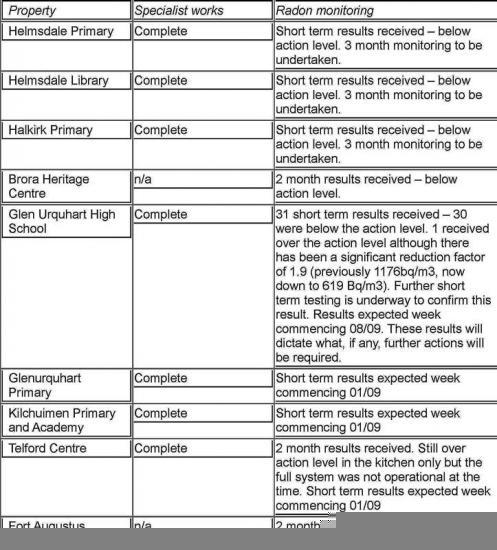Radon works to Council properties - Highland Council Briefing
1st September 2014

The Highland Council's Director of Education, Culture and Sport has updated school head teachers and local Council members on radon works in their areas. The following briefing was issued on Friday 28 August 2014.
Over the summer the Council has been taking action to reduce radon in nine properties which include five schools. Testing earlier in the year showed all properties had radon above the statutory action level of 400 Bq/m3. Remedial works were designed for the Council by a specialist radon consultant and specialist radon contractors were employed to carry out the installation and commissioning of the systems.
Work has been undertaken on all sites with radon above the action level. Specialist works have been completed on all sites. The up to date position at each facility is shown in the table below.
Given the natural variances in radon, longer term (2-3 month) monitoring will also be under taken.
There has been ongoing liaison with Public Health England (PHE) and the Health and Safety Executive (HSE) throughout this process. Both have advised that they are comfortable to await the results of the initial short-term monitoring period before deciding whether additional works or alternative measures such as occupancy restrictions are required. PHE has also advised that it will be helpful if the premises continue in normal use for the confirmatory tests, and pending the monitoring results.
RADON - FREQUENTLY ASKED QUESTIONS
1. What is radon?
Radon is a naturally occurring radioactive gas. It is produced by the decay of uranium that is present in all rocks and soils. In open air, it disperses very quickly, but can accumulate to high levels in buildings. The amount in the indoor air depends on the local geology and the building design, heating, ventilation and use. Radon is present in all buildings, including homes, so we all breathe it in throughout our lives. For most UK residents, radon accounts for about half of their total annual radiation dose. The average level in UK homes is 20 becquerels per cubic metre of indoor air (Bq/m3).
2. What are the health effects of radon?
Radon is present in all air. Everyone breathes radon in every day, usually at very low levels. However, exposure to high levels of radon increases the risk of developing lung cancer. There is no evidence that exposure to radon increases the risk of other cancers and exposure to radon does not cause short term health effects such as shortness of breath, coughing, headaches or fever, or long term chest conditions such as asthma, emphysema or chronic obstructive lung disease.
Significant long term exposure to high levels of radon can increase the risk of lung cancer. Of the 33,000 deaths from lung cancer every year in the UK, between 1,000 and 2,000 deaths are related to radon; however the majority of these are in smokers and ex-smokers. The risk of lung cancer is highest for people who smoke tobacco and have high radon exposures. If you smoke tobacco, quitting is the most effective way of reducing the risk of lung cancer. The risk of lung cancer from exposure to radon in lifetime non-smokers is small and many times lower than the risk of lung cancer if you smoke tobacco.
3. What is the definition of ‘significant long-term exposure' to radon?
Everyone is exposed to radon throughout their lifetime - it is unavoidable (exposure is the combination of the radon level and the duration). With radon we think of exposure duration in terms of many years, usually decades. Hence the action levels are set at radon concentrations where measures are justified to control radon exposure and reduce the risk of adverse health effects, assuming that people would be exposed to it over the long term.
4. What are radon ‘action’ levels’?
Radiation protection standards in workplaces are set by the Ionising Radiations Regulations 1999, which apply if radon levels are above 400 Bq/m3. If levels exceed this concentration, action should be taken to reduce radiation exposure to staff and other occupants. Usually this is done by lowering the radon level. There is no way to eliminate all radon from the world. However, by putting in place some minor building work the levels can be reduced below the action level so that the risk becomes very small.
5. Are children more at risk from radon than adults?
There is no evidence that radon exposure during childhood causes a greater risk than that during adulthood. Action levels for radon in homes, and also for workplaces (including schools), take into account that exposure could take place over many years. The action levels are set accordingly.
6. How do you know where to test for radon?
The UK's primary experts on radiation protection, Public Health England (PHE) publish radon maps for the UK. These identify areas with a higher probability of radon concentration exceeding the radon action level. The maps for Scotland are available here http://www.ukradon.org/information/ukmaps/scotland
7. Why were schools monitored for radon?
As the Highlands were identified as having radon-affected areas the Council, like other employers, is required to monitor its premises for radon and act accordingly if levels are found to be above the action level. The Council has developed a monitoring programme. Radon tests were carried out at 13 schools over the required three month period in 2013. The results have been analysed and, in the case of five schools, have prompted the need for remedial measures to be put in place at the schools.
8. How was the radon level measured?
Radon levels can vary between adjacent buildings and even in a room, radon levels can vary from day to day and hour to hour. Because of these fluctuations, radon levels are normally measured over a three month period with the use of small plastic detectors.
9. My children have attended this school with high radon for many years – what are the risks?
The increased risk to pupils, caused by exposure to radon at school, is very low. It is especially important that older pupils do not smoke since this is harmful to health in itself and increases the risks from radon exposure.
10. I have worked in the school for many years, am I at risk of getting lung cancer?
The risk of staff members developing lung cancer from radon exposure during the time they have worked at school is very small. The risk is higher in those who also smoke, so for smokers the most effective way of reducing the risk further is by stopping smoking. The remedial work which will be carried out will limit exposure to radon in the future for staff members working in the school.
11. What about the rest of the community?
All employers and landlords are obliged to check if their properties are at risk. A first step is to check radon maps available at the website www.ukradon.org. They may also need to carry out testing which can be simply arranged through the same website at minimal cost (around £25 for a radon detector).
Householders are encouraged to check the maps available at the website www.ukradon.org. The www.ukradon.org website also offers a detailed map check on individual properties for around £4. If the house is in an area at risk from radon then monitoring should be carried out. This can be simply arranged through the same website at minimal cost (around £50 for a radon test pack).
12. When will the next update be issued?
An update will be issued to all schools once further monitoring results are received.
13. Who can I contact at the Council to discuss issues with schools?
Please contact Highland Council’s Environmental Health team on 01349 886603, or email env.health[AT]highland.gov.uk
14. Who can I contact if I want further information on radon or to discuss risks?
Public Health England can be contacted directly if you wish to discuss any of the items further. Public Health England can be contacted on 01235 822622, or email through the website http://www.ukradon.org/contactform
General information about radon and health risks can be found at www.UKradon.org
Related Businesses
Related Articles
Exciting Career Opportunities With The Highland Council Now Open For Applications
# 10 December 2025 Career opportunities with The Highland Council The Highland Council is looking to fill a variety of posts relating to civil engineering and flood risk management based in locations across the area. Included are opportunities specifically for civil engineering graduates and technicians, providing the ideal job with career progression for anyone recently qualified and ready for a varied and interesting role.
What the NC500 Research Projects Are Designed to Do - and Why They Matter for the Highlands
As the North Coast 500 approaches its tenth anniversary, it has become one of Scotland's most well-known tourism success stories. The 516-mile loop around the far north of the Highlands has been celebrated internationally, marketed as a world-class road trip, and credited with transforming visitor numbers in some of Scotland’s most remote areas.Help Shape the Future of Thurso
The Highland Council is inviting people that live, work, or study in Thurso, to come along to the public consultation events to have their say. This is an opportunity to help shape the future of Thurso, to gather views and ideas.
Are Scottish Councils Quietly Reversing Outsourcing? A Look at Insourcing, Cuts and the Highland IT Shift
A notable article in the Guardian on 6 December 2025 noted the high sums being paid by London councils outsourcing services to private firms. The article starts with the reduction in council funding by UK government since 2010.Council welcomes Visitor Levy flexibility plan
The Highland Council welcomes moves by the Scottish Government to introduce greater flexibility on how it could design a Visitor Levy Scheme for consultation. The Visitor Levy (Scotland) Act 2024 currently provides local authorities with discretionary powers to implement percentage-based levies following statutory consultation.Highland Council is reaching out for views to shape its next 26/27 budget.
As it looks to set out its forthcoming priorities, the council is seeking involvement from members of the public, including businesses, community groups, parents, and young people. All their opinions are going to be crucial in deciding how Highland Council will take on its budget challenge for 2026-2027.Have your say in Thurso's future £100million investment by attending public consultation events
Thurso is to benefit from £100m investment in education and community facilities and are rolling out the first phase of public consultations on 9 and 10 December 2025. The Highland Council is inviting people that live, work, or study in Thurso, to come along to the public consultation events to have their say; this is an opportunity to help shape the future of Thurso, to gather views and ideas.Finding new owners for empty homes - Scheme launched to help return more empty homes to active use
A new online portal has been launched to bring empty homeowners together with prospective buyers or developers with the aim of facilitating more properties to be used as homes again. Covering the whole of Scotland, this builds on the success of local pilots, referred to as "matchmaker schemes".Consideration for short term let control area in Skye and Raasay
Steps towards introducing a short term let control area have been considered by Highland Council's Isle of Skye and Raasay area committee. On Monday (1 December 2025) the committee heard evidence to justify the grounds for the introduction of a Short Term Let Control Area covering all or part of Skye and Raasay.Workforce North event spotlights Highland economy
EMPLOYERS and educators from across the Highlands have gathered to hear how a new initiative is aiming to transform the region's economy. Workforce North - A Call to Action brought together business leaders and teachers from primary and secondary schools from across the Highland Council area with a wide range of partners geared towards education, learning and skills development at Strathpeffer Pavillion.
